Introduction
In the digital marketing landscape, Pay-Per-Click (PPC) management has emerged as a vital strategy for businesses seeking to enhance their online presence and drive targeted traffic. This approach not only allows advertisers to pay only for actual engagement but also requires a comprehensive understanding of various components such as:
- Keyword selection
- Ad creation
- Performance monitoring
For healthcare organizations, the stakes are particularly high; effective PPC management can lead to increased patient inquiries while navigating the complex regulatory environment of the industry. As the demand for skilled PPC specialists rises, understanding their role and the intricacies of PPC management becomes essential for organizations aiming to thrive in this competitive arena.
This article delves into the core principles of PPC management, the significance of specialists in this field, and the critical components necessary for successful campaign execution.
Defining PPC Management: An Overview
Understanding what is PPC campaign management involves a strategic approach to overseeing and optimizing paid advertising campaigns across diverse digital platforms. This model operates on the premise that advertisers incur a fee each time their ad is clicked, rendering it a cost-effective method for driving targeted traffic to websites. To understand what is PPC campaign management, one must consider several crucial elements, including:
- The selection of appropriate keywords
- Crafting persuasive ad copy
- Consistently monitoring performance metrics to enhance return on investment (ROI)
For healthcare organizations, this is particularly vital, as it not only facilitates the acquisition of new patients but also necessitates adherence to evolving industry regulations related to advertising practices. As pointed out by Jack Shepherd, Co-Founder & Marketing Director,
In 2023, Google profited significantly, generating an astounding 237.86 billion U.S. dollars from ads, demonstrating the immense financial impact and potential of well-managed PPC approaches.
This financial success is further supported by the case study titled ‘Google’s Ad Revenue in 2023,’ which showcases how effective PPC advertising can drive substantial revenue.
Additionally, with 83% of viewers preferring short videos, incorporating video content into PPC strategies could enhance engagement and effectiveness. Furthermore, clinic owners should consider diversifying their PPC efforts, as about 14% of total search PPC ads revenue is generated by Bing Ads, providing an opportunity to reach broader audiences. Thus, understanding what is PPC campaign management and implementing robust oversight frameworks can significantly amplify visibility while ensuring compliance with regulatory standards.
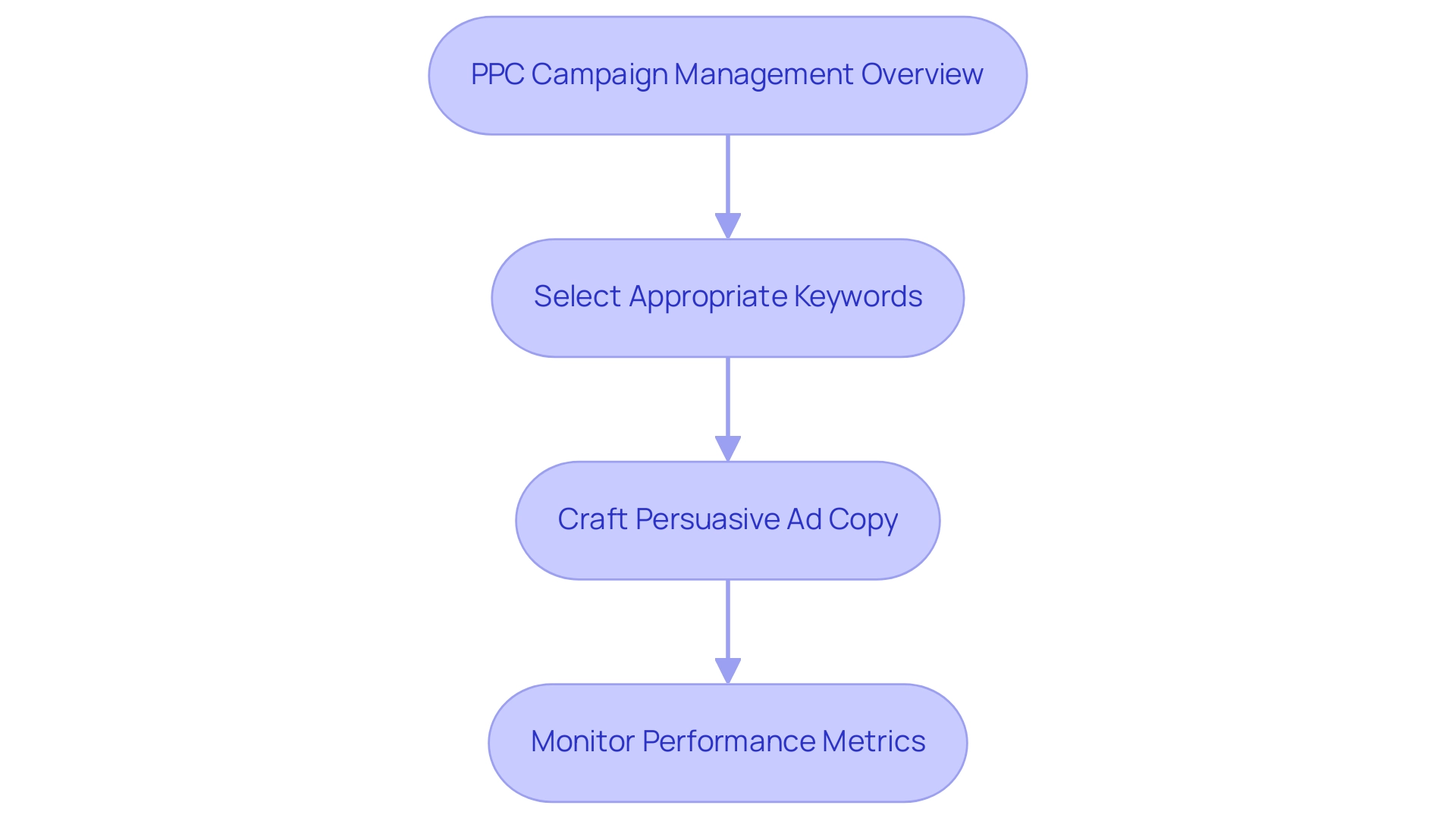
The Role of PPC Specialists: What to Expect
PPC specialists play a crucial role in understanding what is PPC campaign management, which is essential for maximizing online visibility and driving targeted traffic. Their responsibilities encompass a range of tasks related to what is PPC campaign management, including:
- Conducting thorough keyword research
- Crafting compelling ad copy
- Configuring initiatives effectively
- Analyzing performance data to gauge success
To ensure optimal ad placement, they closely monitor budgets and adjust bids accordingly.
In the healthcare sector, PPC specialists face unique challenges; they must adeptly navigate complex regulations and ensure that advertisements comply with legal and ethical standards. As of 2024, the average salary for PPC specialists in Chicago is $48,665 a year, reflecting a growing demand in the industry, with positions offering between $60,000 to $90,000 annually based on location and company. According to Brian Frederick, an expert in digital marketing, ‘The role of PPC specialists is crucial in shaping effective advertising approaches that resonate with targeted audiences.’
Clients can anticipate detailed reporting and insights on performance, allowing them to discern the value generated from their investments. This level of transparency not only fosters trust but also enables continuous optimization of advertising approaches, which is essential to understand what is PPC campaign management, directly impacting overall campaign performance. Moreover, a recent case study highlighted various job openings for PPC specialists across locations such as Tampa, FL, and Los Angeles, CA, illustrating the demand for these professionals and the competitive salary offers that vary by region.
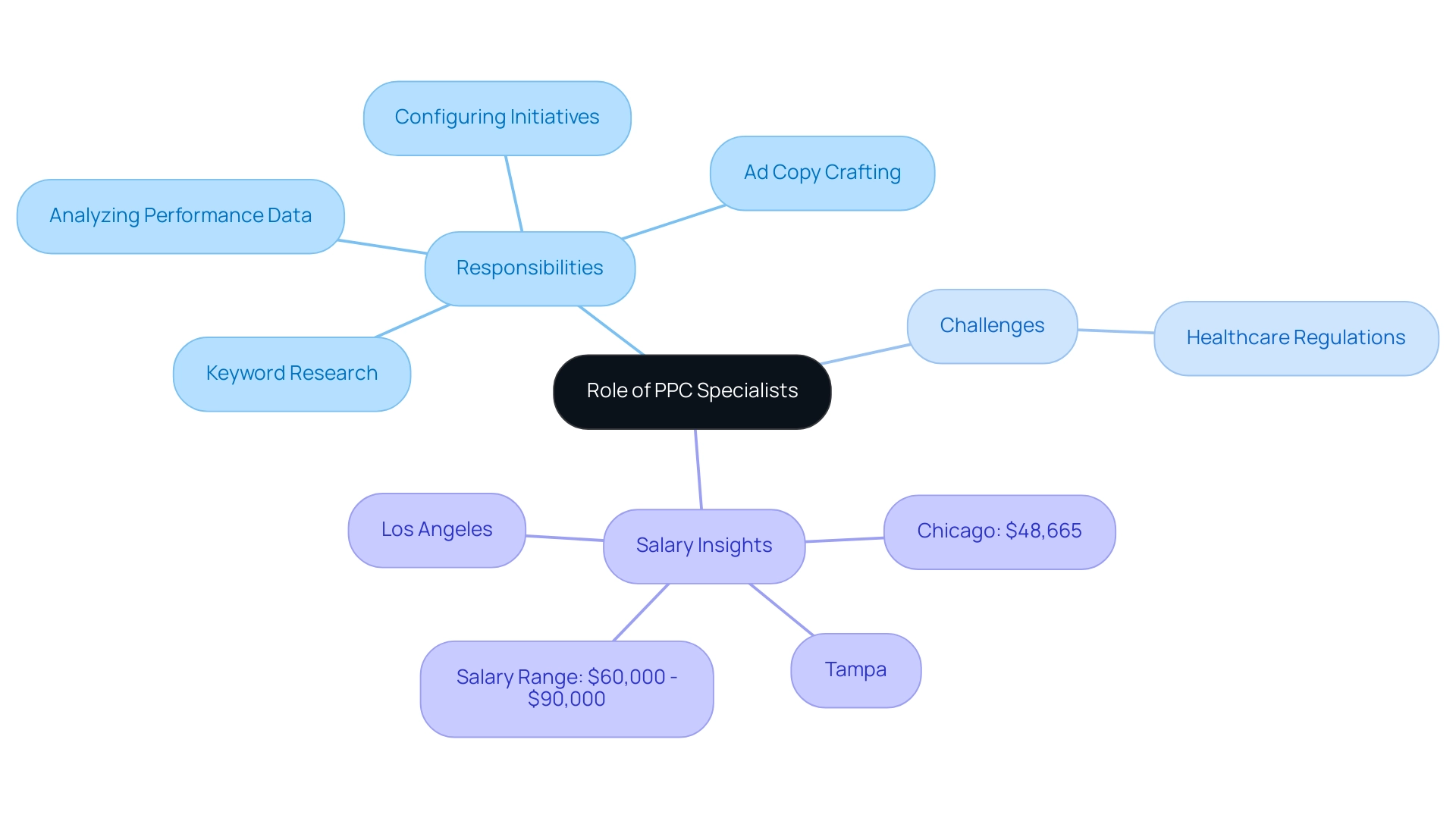
Why PPC Management Matters in Digital Marketing
What is PPC campaign management, and how does it stand as a crucial element in the realm of digital marketing, enabling businesses to engage specific audiences swiftly and efficiently? Unlike organic marketing approaches, which often require considerable time to manifest results, PPC offers immediate visibility across search engines and social media platforms. For healthcare organizations, knowing what is PPC campaign management can significantly enhance patient inquiries, bolster brand recognition, and provide a competitive advantage in an increasingly crowded marketplace.
Current statistics reveal that over 93% of internet users are active on social media, highlighting the platform’s potential for targeted outreach. Additionally, with 85.6% of programmatic display ad spending allocated to banners, videos, and other display ad units, it’s evident that display ads play a significant role in PPC strategies. Furthermore, PPC initiatives can be meticulously tailored to reach particular demographics, ensuring marketing efforts are concentrated on individuals most likely to seek medical services.
As noted, more than 80% of the internet audience globally is reached by Google display advertisements, underscoring the effectiveness of PPC in reaching a wide audience. This strategic targeting not only maximizes resource allocation but also optimizes the likelihood of conversion, which exemplifies what is PPC campaign management as a cornerstone of digital marketing in 2024. The social media market, projected to reach nearly $256 billion by 2028, further demonstrates the swift expansion and significance of social media in PPC efforts, making it a crucial emphasis for healthcare organizations.
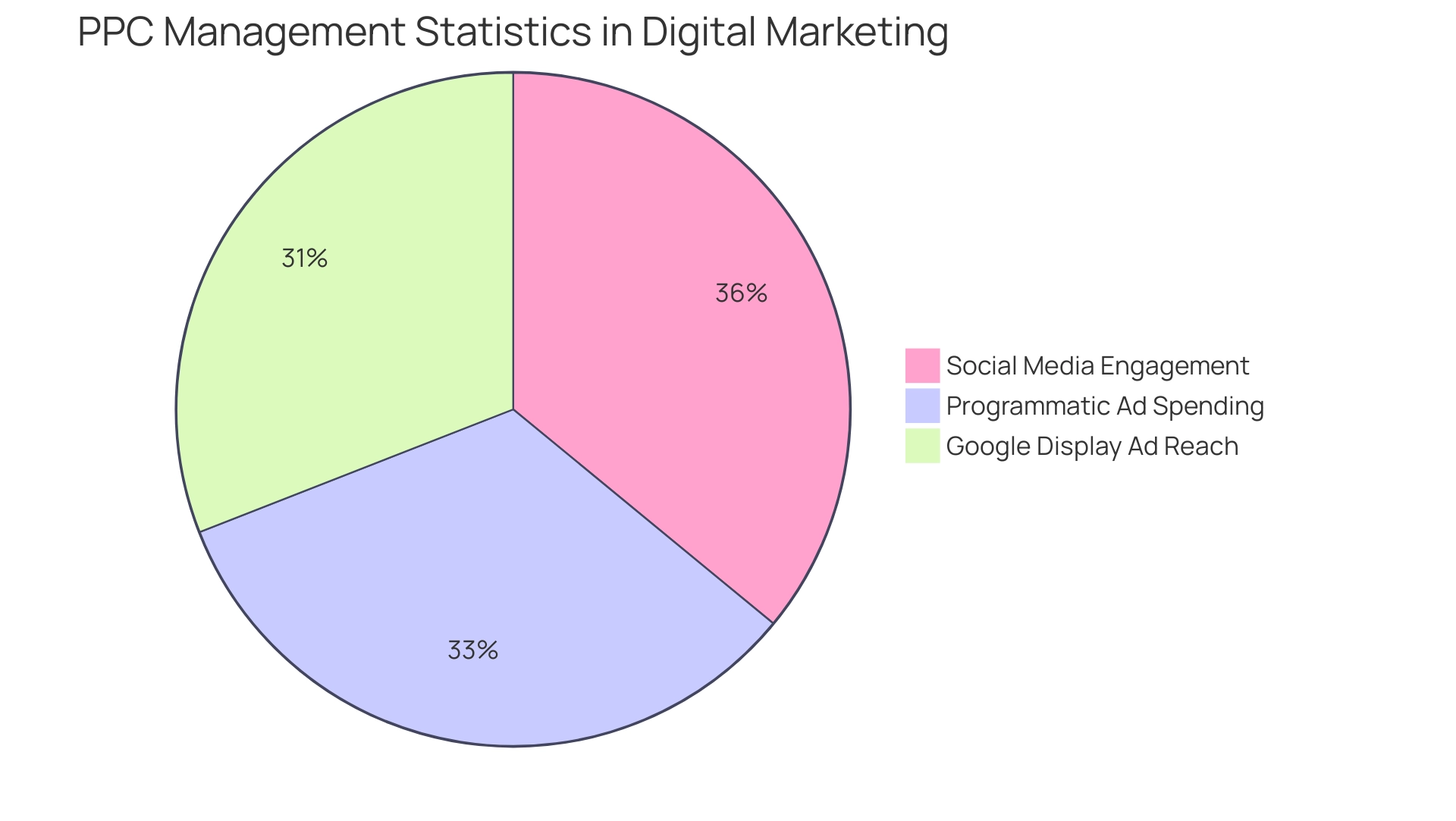
Key Components of Effective PPC Campaign Management
Understanding what is PPC campaign management involves effective management of pay-per-click (PPC) initiatives, which includes several critical components:
- Keyword research
- Ad creation
- Budget management
- Performance analysis
Keyword research is essential, as it entails identifying the precise terms potential patients use when seeking healthcare services. This step is essential; effective keyword methods can significantly improve the visibility and relevance of ads.
Ad creation must focus on developing compelling copy and visuals that resonate with the target audience, ensuring that the messaging aligns with patient needs and interests. Significantly, over 80% of the global internet audience is engaged by Google display advertisements, highlighting the importance of utilizing Google’s platform in PPC strategies. Budget management plays a pivotal role in optimizing spending to achieve optimal results without exceeding financial constraints.
Furthermore, performance analysis is crucial, as it involves monitoring key metrics such as click-through rates (CTR) and conversion rates to continually refine campaigns. Current statistics show that 95% of paid search ad clicks on mobile devices are driven by Google, highlighting the necessity of adapting PPC approaches to leverage this trend. Additionally, recent insights suggest that visual and AR-driven ads are projected to generate $5.2 billion in revenue by 2024, highlighting the need for innovative approaches in ad creation to stay competitive.
As illustrated in the case study titled ‘Leverage the Power of Paid Search in Your Marketing Strategy,’ PPC offers businesses opportunities to engage target audiences and maximize ROI. Understanding what is PPC campaign management is indispensable for driving successful outcomes in PPC marketing, particularly in the healthcare sector, where effective strategies can enhance patient engagement and maximize return on investment.
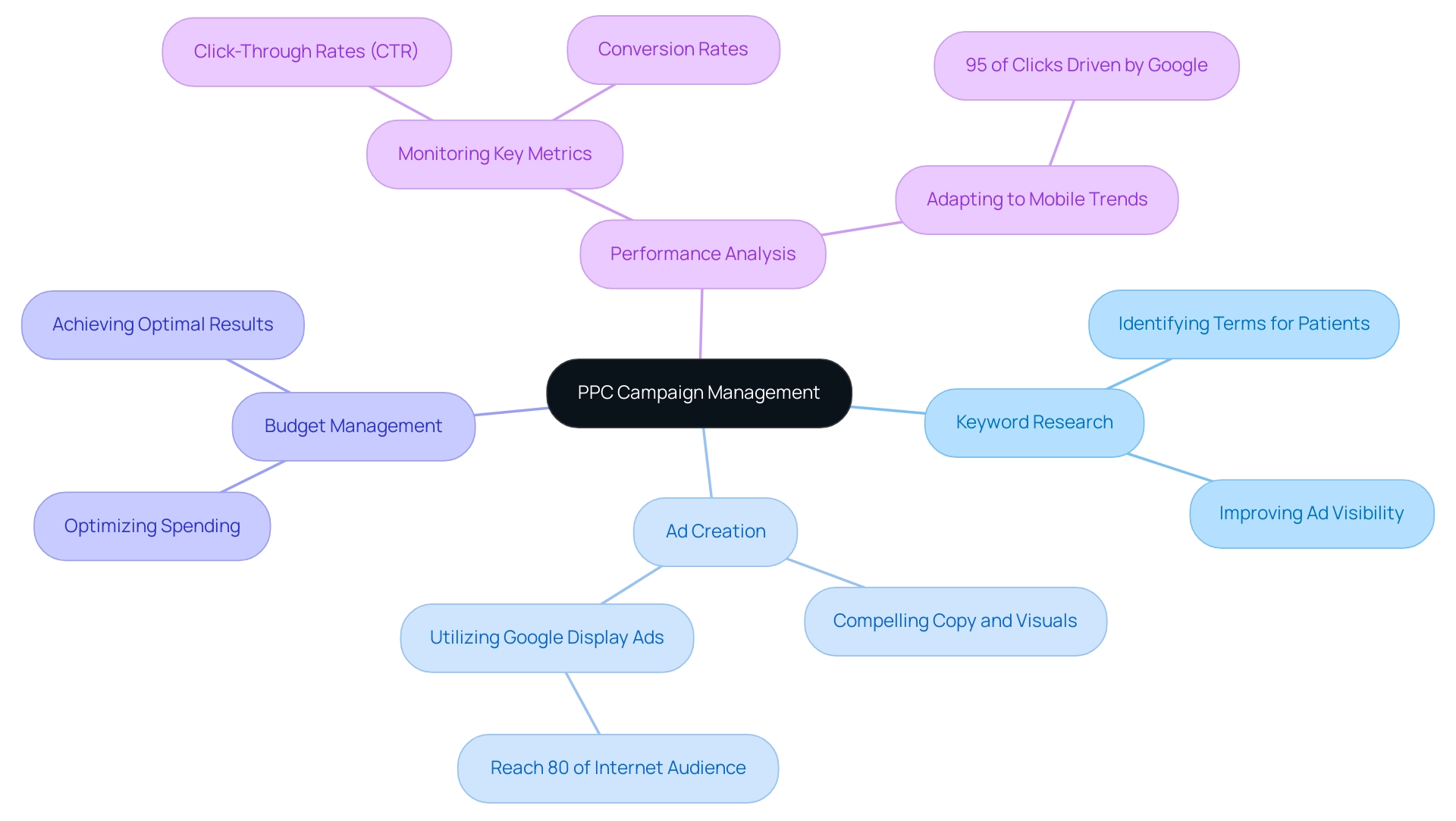
Navigating Challenges in PPC Management
Understanding what is PPC campaign management presents distinct challenges, particularly for healthcare providers navigating the competitive landscape of 2024. With Google display advertising efforts reaching over 80% of the internet audience, understanding the competitive dynamics is crucial. Intense competition for keywords and changing costs add to the complexities of understanding what is PPC campaign management.
For instance, the average cost per click in healthcare PPC initiatives has shown a marked increase, necessitating careful budget management. To effectively address these challenges in what is PPC campaign management, it is essential for marketers to:
- Conduct regular performance reviews, allowing for informed adjustments in bids based on keyword effectiveness.
- Continuously test various ad formats to optimize engagement and conversion rates.
Recent statistics indicate that personalized PPC landing pages can enhance effectiveness by 5%, further emphasizing the importance of customized approaches. Furthermore, HubSpot observes that video advertisements are projected to sustain a 55% greater CTR in comparison to display ads, emphasizing the importance of including educational videos in PPC strategies. As telemedicine’s usage is projected to grow by 20% annually, integrating these services into PPC strategies will be vital; the case study on the expansion of telemedicine underscores the necessity for healthcare providers to promote these services effectively.
Staying updated on digital advertising regulations and platform algorithm changes will ensure that campaigns remain effective. By proactively managing these aspects, healthcare organizations can significantly enhance their understanding of what is PPC campaign management, achieving better visibility and engagement in a competitive market.
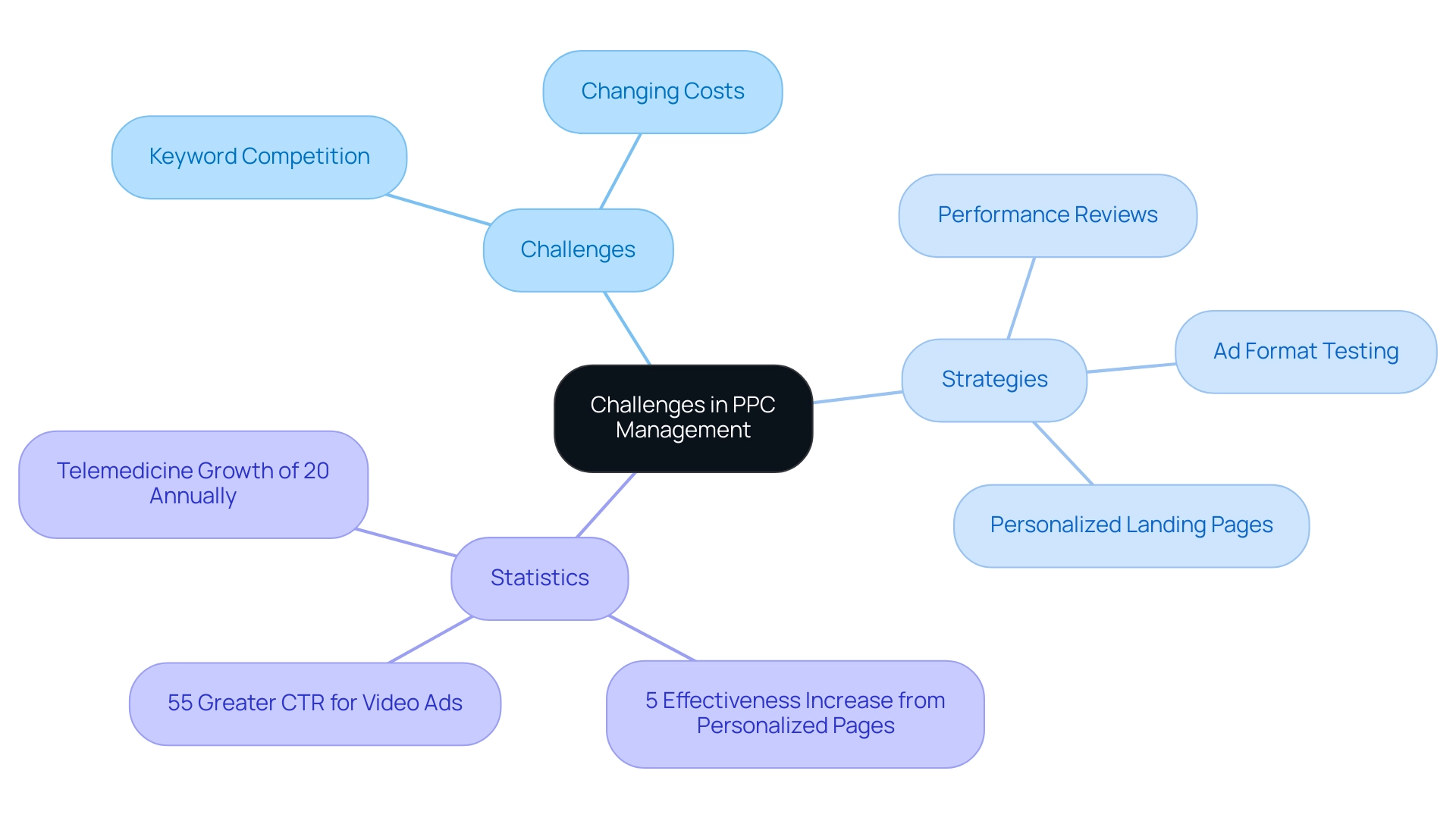
Conclusion
PPC management is a pivotal strategy for businesses, especially in the healthcare sector, where effective campaigns can lead to increased patient inquiries and compliance with regulatory standards. The foundation of successful PPC campaigns lies in a comprehensive understanding of key components such as:
- Keyword research
- Ad creation
- Budget management
- Performance analysis
By focusing on these elements, organizations can enhance their online presence and drive targeted traffic, ultimately improving their return on investment.
The role of PPC specialists cannot be overstated; their expertise in navigating the complexities of digital advertising ensures that campaigns are not only effective but also compliant with industry regulations. As the demand for skilled professionals in this field continues to grow, organizations must recognize the value these specialists bring in optimizing advertising strategies and delivering measurable results.
In conclusion, as the digital marketing landscape evolves, the importance of effective PPC management will only increase. By embracing robust PPC strategies and leveraging the insights of specialists, healthcare organizations can position themselves advantageously within a competitive market. This proactive approach will not only enhance visibility but also foster trust and engagement with potential patients, ensuring sustained growth and success in the digital age.

